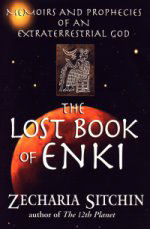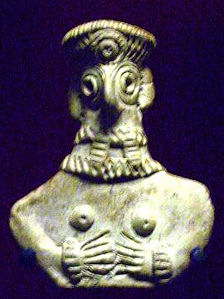
Andy Lloyd's Book Reviews
The Lost Book of Enki

By Zecharia Sitchin
Subtitled "Memoirs and Prophecies of an Extraterrestrial God”
Bear & Co, 2002
ISBN 978-1591430377
$24.00
Zecharia Sitchin has written 6 books as part of his ‘Earth Chronicles’
series detailing his theories about humanity’s origins and the hidden planet
‘Nibiru’, plus several complimentary tomes. His theories are based
upon his scholarly study of ancient Sumerian and Akkadian tablets, and
the remarkably frank accounts therein of the ancient gods, or Anunnaki.
According to Sitchin, the ancient accounts testify to an underlying reality
that challenges our established notions of our origins to the core.
His scholarly contribution to the so-called ‘ancient astronaut’ mode of
thought is unparalleled.
This latest book ‘The Lost Book of Enki’ compliments the ‘Earth Chronicles’,
but it bears little resemblance to his other alternative science books.
Within its pages Sitchin gives us his complete vision of our past. ‘The
Lost Book of Enki’ is a work of literature, written in the style of an
Akkadian epic poem, and provides us with Sitchin’s version of the original
‘sourcebook’ for the Mesopotamian/Egyptian mythologies. He has set
the book out in the form of 14 tablets, written out by the master Akkadian
scribe Endubsar. In the text, Endubsar claims that the tablets were
dictated to him by the god Enki himself. The impression is given
that the reader has in front of him actual historical material, and it’s
easy to see why many readers have taken this book at face value.
But this book is in reality an historical novel, incorporating Sitchin’s
world-view.
The first thing one notices upon picking up this hardback book is that
Sitchin has a different publisher. Perhaps Avon will print 'The Lost
Book of Enki' in paperback, perhaps not. This book breaks an awful
lot of unwritten rules in alternative science, by amalgamating scholarly
research with fiction. Potentially this is a dangerous book for Sitchin,
because it opens him up to charges of making the whole thing up, simply
because he has started to fill in the mythological gaps with his own account.
Worse still, it is by no means clear what parts of the book have been directly
derived from the ancient texts, and which have been essentially dreamt
up by Sitchin.
For his part, he openly offers this book as a possible blueprint
for the original source-book upon which all Mesopotamian mythology was
once based. It stands as a literary work, rather than a theoretical
study. He has brought together many stories, from epics and fragments
alike, and made a cohesive whole from them based upon his theory about
extra-terrestrial gods. The sheer scale of his vision is breathtaking.
Perhaps Sitchin felt that he needed to give this vision an appropriate
form in one book, his Magnum Opus. But I suspect he is taking a big
risk, and I don’t think it’s going to pay off. His regular readers
will already be familiar with 90% of the material in the book, and newcomers
won’t know what to make of it…it contains no word of explanation for the
Sitchin novice.
The other problem is the writing style Sitchin uses. It is written
in the style of ancient Mesopotamian prose, giving one the feeling that
this is the real thing; lost epics that explain everything. Like
I said, this is a dangerous game Sitchin is playing by moving from a science-based
approach to a literary one. I remember struggling with Latin at school,
with its subject-object-verb format and lack of definite articles.
This ancient prose of Sitchin’s isn’t quite so daunting, but the format
takes a bit of getting used to. Occasionally, a modern word will
creep in to the text (like ‘diaper’ for instance, which is American, and hardly
‘ancient’), reminding the reader that this is a semi-fictional work after
all.
There has
been much speculation that Zecharia Sitchin believes that Nibiru is set
to return in the near future. ‘The Lost Book of Enki’ quashes this
rumour once and for all. Nibiru appears at the beginning of the Nippur
calendar in the book, which he has previously denoted as 3760BC, and is
celebrated by the Anunnaki as the Nibiruan New Year. According to
Sitchin’s timeline, then, Nibiru would have again appeared in 160BC, and
is due to appear next in 3440AD, or so. Unfortunately, the chronology
of ‘The Lost Book of Enki’ ends with the destruction of the Akkadian society
by the unleashing of Anunnaki weapons of mass destruction (an event recently
linked to a meteor impact in Iraq around 2300BC [The Sunday Telegraph
4/11/01]). It does not seek to explain Nibiru’s subsequent historical
appearance. Even so, Sitchin appears unequivocal…Nibiru will not
be returning during any of our lifetimes.
Another new detail of interest is the appearance of Nibiru in the constellation
of Leo during the perihelion transit that brought about the Flood (described
in some detail in this new book). If this is what he meant (and he
could possibly have alluded to the Age of Leo), I’m gratified that The
Lion is now included on the list of constellations that Nibiru can be visibly
seen against during perihelion. The adjacent constellation of Cancer
appears to be the first point when Nibiru crosses the ecliptic (Taurus
marks the second), and a parallax effect could easily place Nibiru in Leo
as it first brightens from the void. I have found fascinating evidence
from around the time of Christ that Nibiru indeed appeared in Leo (see
DarkStar16).
Other aspects of this book indicate to me that Sitchin does not really
have a proper understanding of planetary science, which is worrying.
For instance, his portrayal of the 'seasons' of Nibiru, with respect to
its relative proximity to the Sun, fall way short of the mark. Nibiru's
closest approach to the Sun is too short, and too distant to have any seasonal
impact at all...if Nibiru is simply a terrestrial planet following a long-period
comet path, that is. For 99.9% of its orbit Nibiru would be absolutely
frozen solid, down to the most volatile of its atmospheric gases.
Sitchin seems to reject my notion of a sub-brown dwarf and warmed moons,
which is a pity.
Sitchin concentrates mostly on the mythology of the Anunnaki, and the
complex relationships between them, and us. His account of the artificial
creation of humans is excellent in this book, giving a much more dramatic
treatment of this subject than before. His writing reflects the incredible
complexity of the ancient Mesopotamian myths, and underlines how facile
it is to seek to explain them simply in terms of weather gods and the like.
He also rethinks the nature of the 'Igigi', and creates a new scenario
for the Face on Mars.
Would I recommend this book? Not as readily as some of his others that
seek to apply more rigorous analysis to actual ancient texts. ‘The
Lost Book of Enki’ is written as though it was a classic, but it is unlikely
to become one. But if you enjoy reading Homer, or the Epic of Gilgamesh,
this book may well appeal to you.
Book review by Andy Lloyd, 22nd
January 2002 Books for review can be sent at the author/publisher's own
risk: 
![]() You can order your copy through Amazon.com here:
You can order your copy through Amazon.com here:![]() If you live in the UK, you can obtain your copy through Amazon.co.uk here:
If you live in the UK, you can obtain your copy through Amazon.co.uk here:
Andy Lloyd's Book Review Listings by Author
Andy Lloyd's Book Review Listings by Subject

You can keep informed of updates by following me on Twitter:
![]()
Or like my Facebook Page: https://www.facebook.com/darkstarandylloyd